| operative network | writing archive: columns - reviews - interviews - features
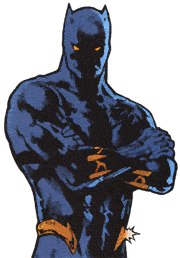 T'Challa: "I am your cousin, M'Koni—you are certainly exempt from matters of protocol." T'Challa: "I am your cousin, M'Koni—you are certainly exempt from matters of protocol."
M'Koni: "Honor to whom honor is due, lord ..."
—Black Panther #31
If you know anything about my comic book reading habits, you know there are two monthly titles I hold in higher regard than all others. During the next two columns, I'm going to, as best as I can, tell you why.
I saw the first issue of the current Black Panther series at my then-regular comic book store Golden Apple Comics on Melrose in Hollywood (I've since switched to Culver City's Comics Ink for back issues when NPO can't help me, and if you read this month's Wakandan Embassy letter in BP #31, you'll see some of why). I had recently finished Hugh Pearson's The Shadow of the Panther and was rereading the autobiographies of Elaine Brown and Assata Shakur (if you don't recognize those names, open another browser window, open your search engine of choice, and go do some research. The rest of us will wait here for you.). So when I saw that title sitting on the alphabetized racks (the customer service leaves something to be desired, but the arrangement of new books at Golden Apple is superlative), I had to stop. I'm a long way from my "kill whitey" days back in college, but I'm still a very pro-Black kind of guy, so I wanted to find out more.
I picked the book up, took it home and read it. Several times. It pimp-slapped the conventions of linear storytelling, instead leaping from point to point in the story, leaping ahead and falling into flashback. It was intricate and made me think. I said nothing of this to my comics reading friends, but it stayed in my mind.
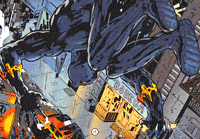 I picked up issues two and three with the same sense of quiet interest. I read each one individually, carefully. I sat down with all of them at once, watching T'Challa begin to unravel a conspiracy to topple his government funded and masterminded by elements of the US government. I began to marvel at the skill and craft at which the book was put together. The staggering intensity of Mark Texeira's artwork helped, too. All around, I was floored. I then began to preach the word.
I picked up issues two and three with the same sense of quiet interest. I read each one individually, carefully. I sat down with all of them at once, watching T'Challa begin to unravel a conspiracy to topple his government funded and masterminded by elements of the US government. I began to marvel at the skill and craft at which the book was put together. The staggering intensity of Mark Texeira's artwork helped, too. All around, I was floored. I then began to preach the word.
One of my best friends went through a rites of passage program with me in college. He practices African spirituality and has done speaking engagements in the same circles as the Nation of Islam and the Mooney Twins (Paul Mooney's boys? We'll wait while you go hit the search engine again). I began to try to convince him about this book. He'd come up on The Invaders and old school Fantastic Four, and wasn't too keen on getting back into his childhood hobby. Months went by, and to no avail, he ignored my gospels.
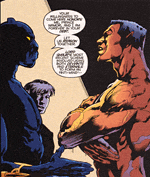 We were supposed to meet some friends one Saturday, and he came over to my apartment, a bit early. I was tapping away on my Mac at the time, and he noticed my stack of Black Panther comics near my desk lamp.
We were supposed to meet some friends one Saturday, and he came over to my apartment, a bit early. I was tapping away on my Mac at the time, and he noticed my stack of Black Panther comics near my desk lamp.
"Hey, this is that comic book you've been telling me about," he said, leafing through and looking over the covers. I was up to issue #12 by this time.
"Yes, that's correct," I replied quietly, never taking my eyes off the monitor. I may have had a hard time communicating the splendor of the title, but hard evidence rarely fails.
He said little else, and started reading. About a half hour later, I got a call from our friends, they were stuck in Torrance with somebody's girl doing something stupid, and we'd have to reschedule.
"Bruh," I said, "they're not coming, looks like we'll have to do this some other time."
"Uh huh," he replied, never even looking up. He was on issue #7 by then.
I kept working on the computer (I was working on my Operative Network site, a version or three older than what's up there now), and he kept reading. He finished the last issue I had and sat there, looking at me for a moment. I waited, never looking over at him, until finally he spoke.
"You bastard."
I cracked up laughing, dropping the keyboard off my lap and knowing my work was done. He got up and drove to Golden Apple, buying the entire run.
Between the two of us, we've started two or three others on the same path, all of whom are mad as hell they got hooked. It's fun work.
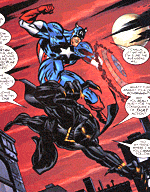 Why is Black Panther so good? Is it the delicacy with which it is created, which gives an issue like #26, the start of a world war with T'Challa and Ororo of the X-Men sharing tender moments, both in their youth and the present day? Is it the comedy, as in issues like #17, where snake-themed villain Cottonmouth locks his jaws around Luke Cage's arm and holds on while getting pummeled and talked about until T'Challa bounces his vibranium-soled boots off said villain's head (there are tons of laughs in #17, that's just one of the best). Or is it the series' narrator, Everett K. Ross, based loosely on most of the characters done by Michael J. Fox, a cool/nerdish/nebbish/great guy who is never fully aware, but always fully entertaining? Is it the one-two punch of Sal Velutto and Bob Almond, who have developed a relationship with the team that makes the plot and script sing into life month after month?
Why is Black Panther so good? Is it the delicacy with which it is created, which gives an issue like #26, the start of a world war with T'Challa and Ororo of the X-Men sharing tender moments, both in their youth and the present day? Is it the comedy, as in issues like #17, where snake-themed villain Cottonmouth locks his jaws around Luke Cage's arm and holds on while getting pummeled and talked about until T'Challa bounces his vibranium-soled boots off said villain's head (there are tons of laughs in #17, that's just one of the best). Or is it the series' narrator, Everett K. Ross, based loosely on most of the characters done by Michael J. Fox, a cool/nerdish/nebbish/great guy who is never fully aware, but always fully entertaining? Is it the one-two punch of Sal Velutto and Bob Almond, who have developed a relationship with the team that makes the plot and script sing into life month after month?
It's none of those things really. On Usenet, writer Christopher Priest has shown T'Challa in comparison to Captain America and Batman, while at the same time placing the Panther outside those two for factors that make him such a deeply fascinating character. 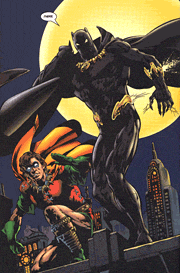 He came to the throne after watching his father be killed by Ulysses Klaw (who was not yet the sound-powered super-villain Klaw at the time) while trying to steal the Wakandan reserve of vibranium (the largest such reserve in the world). He spent his formative years studying in the best schools in the world. He rules a nation the size of New Jersey that has technology on par with or superior to any nation in the Marvel Universe. All this in a body trained to peak human standards, with a genius level IQ and a brain that's twenty steps ahead of everyone. A poker face that almost never cracks (and when it does, like in issue #27 or this month's issue #31), it's so momentous it pulls the reader forcefully to the edge of their seats. It's the delicate balance by which all the plates are kept spinning (and sometimes falling) that makes this book such a treat, and it has been referred to in newsgroups as an equivalent to TV's The West Wing. He came to the throne after watching his father be killed by Ulysses Klaw (who was not yet the sound-powered super-villain Klaw at the time) while trying to steal the Wakandan reserve of vibranium (the largest such reserve in the world). He spent his formative years studying in the best schools in the world. He rules a nation the size of New Jersey that has technology on par with or superior to any nation in the Marvel Universe. All this in a body trained to peak human standards, with a genius level IQ and a brain that's twenty steps ahead of everyone. A poker face that almost never cracks (and when it does, like in issue #27 or this month's issue #31), it's so momentous it pulls the reader forcefully to the edge of their seats. It's the delicate balance by which all the plates are kept spinning (and sometimes falling) that makes this book such a treat, and it has been referred to in newsgroups as an equivalent to TV's The West Wing.
Priest is no rookie to the game. I interviewed him for NPO a few months ago (in retrospect, I feel really sorry about asking him about race and comics, since he has since noted he's been asked that question in almost every interview he's had in his two-decades-plus professional comics career), and he told me of the days when he was Jim Owsley. He talked about hiring Joe Quesada when nobody else would listen to him. He talked about giving Peter A. David his break. He talked about being there at the ground floor, helping usher in the deal that became Milestone Comics. He's an OG, and he deserves respect for being one of the best craftsmen in the genre. His list of credits—Quantum & Woody, Steel, Xero, JLA, The Ray, Deadpool, and on and on and on—could choke a horse. He weaves in and out of old school continuity like a figure skater at a mall ice rink (following the Kurt Busiek/Fabian Nicieza school of "he dug that character up?" including Dakota North in this month's issue). In the words of Chuck D, "He demands respect, 'cause he was great, come on!"

So if you're not already buying Black Panther, quit your whining and your excuses and pick up a few issues already, you jackass! Marvel is, after months and months of cajoling and yelling, releasing the first five issues this summer in the Black Panther: The Client trade paperback, so you can save some money on back issues. Good stuff all around. Guaranteed.
Next time, I'll tell you why Warren Ellis should be left alone to do whatever he goddamned wants. Behave yourselves until then.
|

 T'Challa: "I am your cousin, M'Koni—you are certainly exempt from matters of protocol."
T'Challa: "I am your cousin, M'Koni—you are certainly exempt from matters of protocol."
 I picked up issues two and three with the same sense of quiet interest. I read each one individually, carefully. I sat down with all of them at once, watching T'Challa begin to unravel a conspiracy to topple his government funded and masterminded by elements of the US government. I began to marvel at the skill and craft at which the book was put together. The staggering intensity of Mark Texeira's artwork helped, too. All around, I was floored. I then began to preach the word.
I picked up issues two and three with the same sense of quiet interest. I read each one individually, carefully. I sat down with all of them at once, watching T'Challa begin to unravel a conspiracy to topple his government funded and masterminded by elements of the US government. I began to marvel at the skill and craft at which the book was put together. The staggering intensity of Mark Texeira's artwork helped, too. All around, I was floored. I then began to preach the word.
 We were supposed to meet some friends one Saturday, and he came over to my apartment, a bit early. I was tapping away on my Mac at the time, and he noticed my stack of Black Panther comics near my desk lamp.
We were supposed to meet some friends one Saturday, and he came over to my apartment, a bit early. I was tapping away on my Mac at the time, and he noticed my stack of Black Panther comics near my desk lamp.
 Why is Black Panther so good? Is it the delicacy with which it is created, which gives an issue like #26, the start of a world war with T'Challa and Ororo of the X-Men sharing tender moments, both in their youth and the present day? Is it the comedy, as in issues like #17, where snake-themed villain Cottonmouth locks his jaws around Luke Cage's arm and holds on while getting pummeled and talked about until T'Challa bounces his vibranium-soled boots off said villain's head (there are tons of laughs in #17, that's just one of the best). Or is it the series' narrator, Everett K. Ross, based loosely on most of the characters done by Michael J. Fox, a cool/nerdish/nebbish/great guy who is never fully aware, but always fully entertaining? Is it the one-two punch of Sal Velutto and Bob Almond, who have developed a relationship with the team that makes the plot and script sing into life month after month?
Why is Black Panther so good? Is it the delicacy with which it is created, which gives an issue like #26, the start of a world war with T'Challa and Ororo of the X-Men sharing tender moments, both in their youth and the present day? Is it the comedy, as in issues like #17, where snake-themed villain Cottonmouth locks his jaws around Luke Cage's arm and holds on while getting pummeled and talked about until T'Challa bounces his vibranium-soled boots off said villain's head (there are tons of laughs in #17, that's just one of the best). Or is it the series' narrator, Everett K. Ross, based loosely on most of the characters done by Michael J. Fox, a cool/nerdish/nebbish/great guy who is never fully aware, but always fully entertaining? Is it the one-two punch of Sal Velutto and Bob Almond, who have developed a relationship with the team that makes the plot and script sing into life month after month?
 He came to the throne after watching his father be killed by Ulysses Klaw (who was not yet the sound-powered super-villain Klaw at the time) while trying to steal the Wakandan reserve of vibranium (the largest such reserve in the world). He spent his formative years studying in the best schools in the world. He rules a nation the size of New Jersey that has technology on par with or superior to any nation in the Marvel Universe. All this in a body trained to peak human standards, with a genius level IQ and a brain that's twenty steps ahead of everyone. A poker face that almost never cracks (and when it does, like in issue #27 or this month's issue #31), it's so momentous it pulls the reader forcefully to the edge of their seats. It's the delicate balance by which all the plates are kept spinning (and sometimes falling) that makes this book such a treat, and it has been referred to in newsgroups as an equivalent to TV's The West Wing.
He came to the throne after watching his father be killed by Ulysses Klaw (who was not yet the sound-powered super-villain Klaw at the time) while trying to steal the Wakandan reserve of vibranium (the largest such reserve in the world). He spent his formative years studying in the best schools in the world. He rules a nation the size of New Jersey that has technology on par with or superior to any nation in the Marvel Universe. All this in a body trained to peak human standards, with a genius level IQ and a brain that's twenty steps ahead of everyone. A poker face that almost never cracks (and when it does, like in issue #27 or this month's issue #31), it's so momentous it pulls the reader forcefully to the edge of their seats. It's the delicate balance by which all the plates are kept spinning (and sometimes falling) that makes this book such a treat, and it has been referred to in newsgroups as an equivalent to TV's The West Wing. 